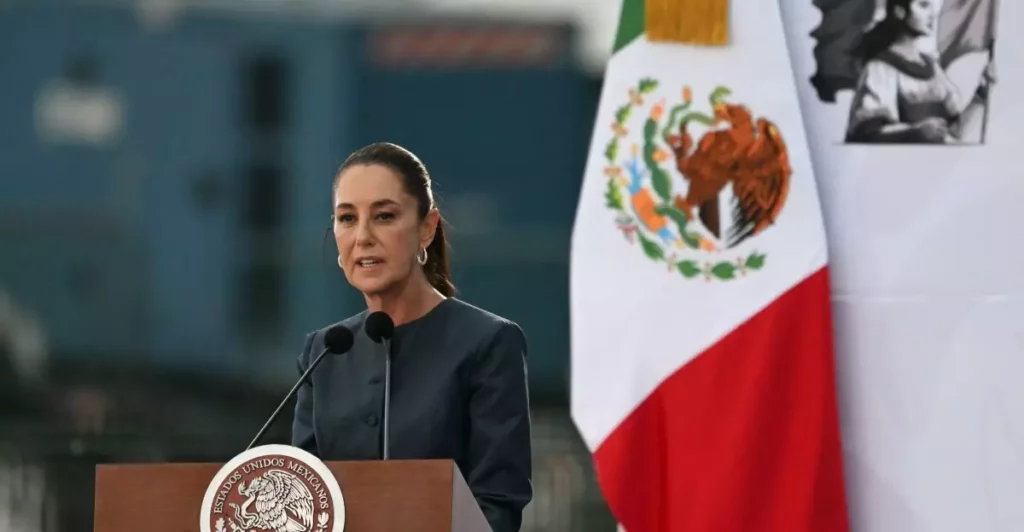The ongoing tug-of-war between Mexico and the United States regarding the Gulf of Mexico’s nomenclature is far more than a bilateral squabble over geography. It acts as a microcosm of larger geopolitical dynamics and national identity struggles. When Mexican President Claudia Sheinbaum took a stand against Google’s alterations of maps to reflect the proposed “Gulf of America,” it wasn’t merely about cartographic accuracy—it was a proclamation of sovereignty and cultural identity. In an era where globalization threatens to homogenize uniqueness, such acts of resistance become essential in determining how countries perceive themselves in relation to one another.
President Sheinbaum’s keen insight into the emotional weight that names carry reveals a critical truth: for many nations, the struggle over naming places is synonymous with a fight for recognition in an unequal power dynamic. The notion that one country can dictate the nomenclature of international waters strikes a discordant note, especially in a historical context where imperialism and colonialism have left lasting scars. By challenging Google’s compliance with the notion of “Gulf of America,” Sheinbaum calls attention not only to a name but to the historical resonance it holds for people who identify with the Gulf as an integral part of their national story.
The Emotional Resonance of Geography
In many cultures, names have inherent meanings and histories that influence how communities view themselves and their relationships with others. The Gulf of Mexico has historically been a connective tissue for Mexico’s coastal communities; renaming it to suit political agendas represents a direct assault on those identities. President Sheinbaum’s lawsuit seeks to reclaim this narrative, arguing convincingly that the emotional and cultural ties embedded in geographical names deserve respect and recognition.
This tension emphasizes a broader theme affecting global politics—the struggle for the dignity of nations to define their identity amid external influences. The idea that names matter also acts as a potent reminder to avoid complacency; we should be demanding more from firms like Google in terms of their corporate responsibility in the cultural and political domains. Is it too much to expect these tech giants to acknowledge the historical nuances of the communities impacted by their platforms?
Corporate Influence and National Sovereignty
The involvement of technology companies like Google magnifies the role of big business in global affairs. In an age where such companies wield unprecedented power, their actions can sway public sentiment and effectuate cultural shifts. When Sheinbaum forcefully urged Google to revert to established nomenclature, she was not only safeguarding Mexico’s identity but also sending a warning to corporations about their responsibilities in international affairs. Companies must recognize that insights from local cultures are as crucial as their profit margins.
Furthermore, the relationship between corporate entities and national sovereignty is fraught with complexities—especially when companies operate in a politically charged environment. With President Trump’s proposed changes to the Gulf’s nomenclature coming to light, it becomes increasingly apparent that corporate obedience to governmental direction can sometimes undermine a fragile national identity.
Nationalism in a Globalized Era
The currents of rising nationalism across the globe have led many to reconsider what it means to belong to a country. Sheinbaum’s strong stance can be interpreted as a tactical embrace of nationalism, reminding her constituents of their shared history while promoting unity in opposition to external pressures. The recent House bill attempting to formalize Trump’s rebranding efforts serves only to intensify existing tensions, forcing Mexican citizens to confront their national pride in stark relief.
Public sentiment has a symbiotic relationship with leadership; as citizens rally around nationalist figures like Sheinbaum, they also assert their agency in brokering their identity. The emotional underpinnings of such a dispute can resonate deeply, offering opportunities for discourse on historical narratives that might have been sidelined in the face of globalization.
A Deeper Dialogue on Ownership and Representation
The emotional and historical implications of renaming a geographical entity extend into broader discussions about ownership and representation. When Google’s map reflects “Gulf of America,” it doesn’t merely alter a label; it conveys a message that the United States controls the narrative surrounding the Gulf. For Sheinbaum, as well as for many Mexican citizens, this signifies a dangerous precedent where their voices can be overshadowed in favor of more dominant narratives.
By invoking a legal framework and appealing to international norms, Sheinbaum’s challenge seeks to empower Mexican citizens and invigorate a national dialogue about their identity in an era marked by external influence. The fight is not simply over a geographical name but is emblematic of a broader struggle for cultural recognition in a globalized world that often dismisses the individuality of nations.
Ultimately, this situation transcends the immediate concerns of geography; it vividly lays bare the intricate threads of power and identity woven into the fabric of international relations. Here lies the heart of a critical geopolitical issue, reminding us that names—offered up by corporations or political entities—carry significance far beyond their immediate implications. It’s a fight for a narrative that respects shared histories and acknowledges the voices of those who seek recognition on the global stage.









Leave a Reply